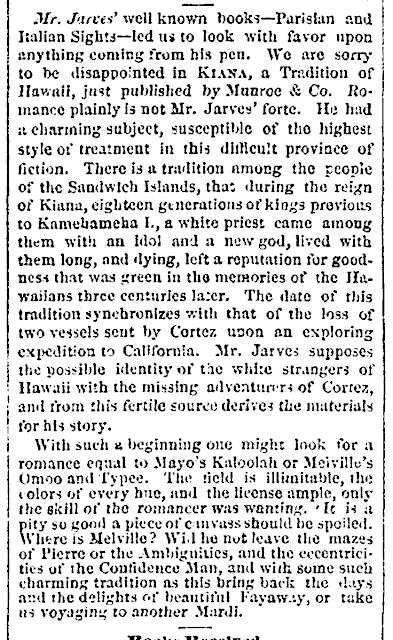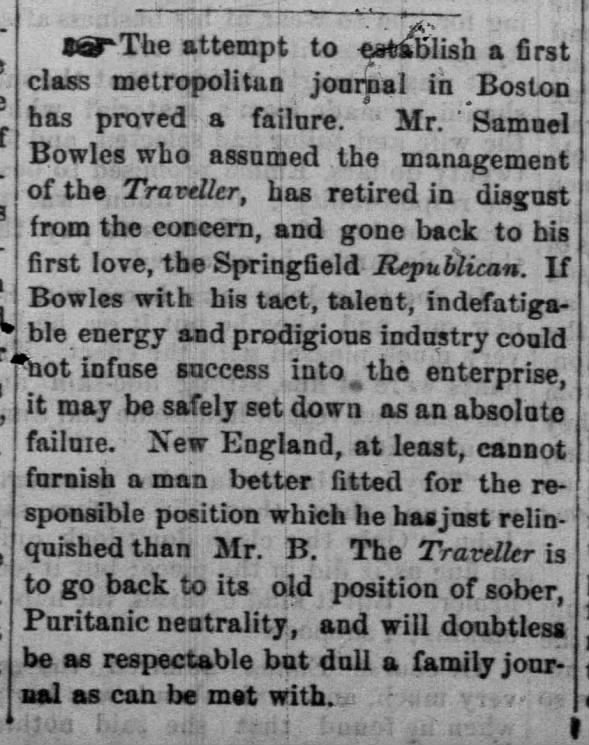 |
| A Man of the Sandwich Islands, with his Helmet © National Maritime Museum, Greenwich, London |
Disappointed with Kiana: A Tradition of Hawaii (1857) by James Jackson Jarves, one contemporary reviewer complained that "Romance plainly is not Mr. Jarves' forte" and wondered,
"Where is Melville?"
Surely the author of Typee, Omoo, and Mardi would have made a more entertaining story out of the same Polynesian material.
A newspaper clipping of the 1857 Kiana review was kept by the Melville family and eventually deposited at Harvard. I'm guessing it's still there:
- G. News clippings and other. Herman Melville papers, MS Am 188-188.6, MS Am 188. Houghton Library. https://id.lib.harvard.edu/ead/c/hou00338c00597/catalog Accessed May 28, 2023.
Jay Leyda put it in The Melville Log Volume 2 on page [583]:
Cited in the back of Volume 2 as "clipping, HCL-M" = "Papers & library of the Melville family, Harvard College Library."
Leyda got the place (Boston) right, along with the correct month (September) and year (1857) of the newspaper clipping. For those who care about such things, I'm happy to supply the missing name and date of the newspaper in which this interesting query appeared. Transcribed below, from the Boston Daily Traveller of September 14, 1857:
 |
| Boston Daily Traveller - September 14, 1857 |
- Leyda, Jay. “Another Friendly Critic for Melville.” The New England Quarterly, vol. 27, no. 2, 1954, pp. 243–49. JSTOR, https://doi.org/10.2307/362806. Accessed 28 May 2023.
Where is Melville?
In the Boston Traveller Bowles or somebody wondered, "Where is Melville?" We might be able to answer the question, now that we know the date on which it appeared in print. Where WAS Herman Melville on September 14, 1857? Back home in Pittsfield, Mass., brainstorming lecture topics, as he revealed the next day in a letter to George W. Curtis:
-- I have been trying to scratch my brains for a Lecture. What is a good, earnest subject? "Daily progress of man towards a state of intellectual & moral perfection, as evidenced in history of 5th Avenue & 5 Points."Even better, brainstorming lecture topics and satirizing utopian schemes of famous communists after reading Robert Owen:
By the wondrous and, hitherto, mysterious organic construction of man and woman, the adults of the first generation that shall acquire a practical knowledge of their own powers to re-form the matured character of each individual, will be enabled, almost to re-create the character of succeeding generations; to re-create it by training each individual from birth, by a new and very superior arrangement of external circumstances, to have a sound physical constitution, to have superior dispositions, habits and manners, to have much valuable knowledge, and to make a daily progress towards physical, intellectual and moral perfection.
-- Robert Owen, The Book of the New Moral World (London, 1836) page 103.
 |
| Robert Owen, Esq. via NYPL Digital Collections |
Related posts:
- Melville's friendly critic at the Springfield Republican
https://melvilliana.blogspot.com/2014/08/melvilles-friendly-critic-at.html
- Melville's anti-communist math
https://melvilliana.blogspot.com/2021/08/2-2-4-melvilles-anti-communist-math.html
- Melville on Justinian and Juvenal, remembered in Minnesota
https://melvilliana.blogspot.com/2021/08/melville-on-justinian-and-juvenal.html
- Can art not life make the ideal?
https://melvilliana.blogspot.com/2015/02/can-art-not-life-make-ideal-herman.html



"He's around," said the Whale. "He comes down to the pier sometimes; we talk; we watch a movie on the big screen teevee they have in the dockside bar, now. But he's here." The Whale was silent for a time, then made Pontiac GTO noises in the water as he submerged, slowly.
ReplyDeleteHaha. Leftists lose it when Melville jokes about the impractical schemes and dreams of deluded utopians. For a prime example see the post on Melville's anti-communist math.
ReplyDeletehttps://melvilliana.blogspot.com/2021/08/2-2-4-melvilles-anti-communist-math.html